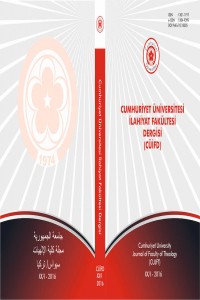Abstract
Mourning of woman after deceased husband or a relative, is
expressed in Arabic as hidad or ihdad. Among the customs of jahiliyyah
whlch were denounced by Islam was the prof wailing, lamenting,
and showing excessive grief for the dead. However, a
wife must observe a mourning period of four months and ten days
for her deceased husband in loyalty to the sacred ties of marriage.
A mourning woman avoids the trappings of things that are cansidered
ziynat according to Islam and tradition. Things listed in the
trappings of the body or clothing, or any other such things can
attract attention. She is alsa not allawed to receive any new proposals
of marriage during this period. However, if the deceased is sameone other than her husband, for example, her father, m other
or son, it is forbidden for her to mourn for more the three days.
The above mentioned limitations, does not apply to man.
Keywords
References
- Haraşi Ebu AbdiHalı Muhammed, Şerlı-u muhtasar-ı halil, (el-Adev1
- haşiyesiyle birlikte), Beyrut, ty.
- Harman Ömer Faruk, "matem", TDVİA, Ankara,2003.
- Hattab Şemsüddin Ebu Abdillah, Meviilıibü '1-celfl li şerlı-i muhtasari'l-lıal'il,
- Beyrut, 2003.
- İbn Abi dm, Reddü'l-muhtfir ale' d-dürri'l-mulıtfir, Beyrut, 2000.
- İbn Battaı Ebu'l-Hüseyn Ali b. Halef el-Kurtub1, Şerlı-u Salıilıi'-1-
- Bulıarf, Riyad, 2003
Abstract
Kadının, kocasının veya bir yakınının ölümünden sonra yas tutması
Arapçada hidad veya ihdad ola;ak ifade edilir. Cahiliye döneminde
uygulanan, ölenin ardından bağırıp çağırma ve elbise yırtma
gibi gelenekler İslam'da kaldırılmıştır. Kocası ölen kadın, nikah
nimetinden mahrum kalmanın sonucu olarak, yeni bir evlilik yapmadan
önce dört ay on gün iddet beklemek zorundadır. Bu süre
içinde beden ve elbiseyle ilgili olarak dinen ve örfen ziynet sayılan
şeylerden uzak durur. Şayet ölen kişi kocasından başkası ise, üç
günü geçmemek üzere yas tutup tutmamakta serbesttir. Yas tutma
ile ilgili sınırlamalar, erkek için geçerli değildir.
Keywords
References
- Haraşi Ebu AbdiHalı Muhammed, Şerlı-u muhtasar-ı halil, (el-Adev1
- haşiyesiyle birlikte), Beyrut, ty.
- Harman Ömer Faruk, "matem", TDVİA, Ankara,2003.
- Hattab Şemsüddin Ebu Abdillah, Meviilıibü '1-celfl li şerlı-i muhtasari'l-lıal'il,
- Beyrut, 2003.
- İbn Abi dm, Reddü'l-muhtfir ale' d-dürri'l-mulıtfir, Beyrut, 2000.
- İbn Battaı Ebu'l-Hüseyn Ali b. Halef el-Kurtub1, Şerlı-u Salıilıi'-1-
- Bulıarf, Riyad, 2003
Details
| Journal Section | Peer-reviewed Research Articles |
|---|---|
| Authors | |
| Publication Date | December 15, 2012 |
| Published in Issue | Year 2012 Volume: 16 Issue: 2 |
CUIFD Creative Commons Atıf-Gayriticari-Türetilemez 4.0 Uluslararası Lisansı ile lisanslanmıştır.


